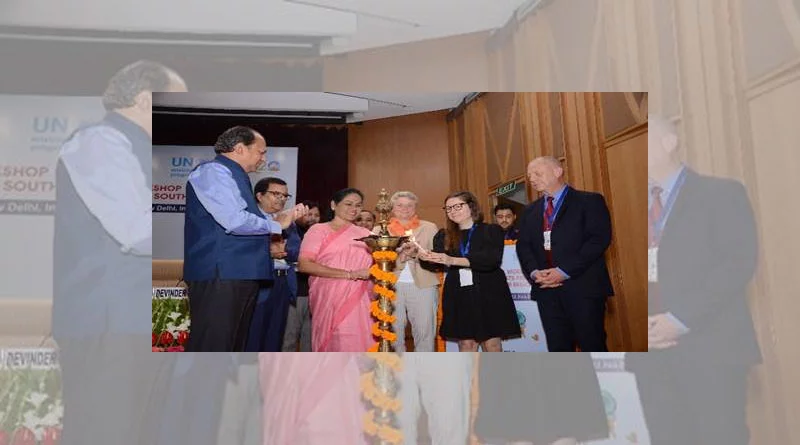New Delhi – The Union Minister of State for Agriculture and Farmers’ Welfare, Sushri Shobha Karandlaje, inaugurated the International Workshop on Food Loss and Waste Prevention in the South Asian Region today in New Delhi. The event, jointly organized by the Indian Council of Agriculture Research (ICAR) and the Thünen Institute, Germany, brought together approximately 120 delegates from India, Bangladesh, Bhutan, France, Germany, Indonesia, Nepal, and Sri Lanka.
During her address, Sushri Shobha Karandlaje commended the efforts made by ICAR and the Thünen Institute, Germany, to address a critical social and economic issue that affects both farmers and consumers alike. She emphasized the global scale of the problem, with approximately 3 billion tonnes of food going to waste annually.
Sushri Shobha Karandlaje stressed the importance of sharing proven technologies and practices from developed and developing countries to minimize food losses and waste globally. She highlighted the role of social organizations in raising awareness among stakeholders and practicing methods to reduce food waste. She also pointed out the environmental and economic implications of food loss, noting that it impacts not only consumers but also the environment and supporting economies.
Karandlaje asserted that South Asia, being a significant food producer and consumer, holds a moral and economic responsibility to reduce food loss and waste. She called for identifying the primary causes of food loss and waste, promoting education and awareness, efficient harvest and storage, smart distribution, industry involvement, donation and food banks, innovation in food packaging, and consumer responsibility. She declared that wasting food is a crime and urged everyone to teach future generations the importance of not wasting food.
Dr. Stefan Lange, of the Thünen Institute, highlighted that mitigating and preventing food loss and waste is crucial to ensure food reaches those in need. He mentioned the “Collaboration Initiative on Food Losses & Food Wastes” and emphasized India’s potential role in influencing neighboring countries to combat food loss and waste.
Clementine O’Connor of the United Nations Environment Programme, France, discussed food loss and waste metrics and their impact on agriculture and the environment. She emphasized the urgency of policy development to achieve the sustainable development goal of reducing food losses by half by 2030.
Dr. K Narsaiah, ADG (PE), ICAR, provided a historical perspective on food losses and gave examples of indigenous methods for preventing food loss and waste practiced worldwide. All delegates pledged to prevent food loss and waste in families, offices, industries, society, and communities.
DDG (NRM), Dr. SK Chaudhari, and Deputy Director General (Ag. Engg.) from ICAR, Dr. SN Jha, welcomed the guests and delegates. They highlighted the varying factors affecting post-harvest losses and food waste, emphasizing the significance of addressing these issues for food security and sustainability in the South Asian Region. They noted that approximately 74 million tonnes of food are lost in India each DDG (NRM), Dr. SK Chaudhari, and Deputy Director General (Ag. Engg.) from ICAR, Dr. SN Jha, welcomed the guests and delegates. They highlighted the varying factors affecting post-harvest losses and food waste, emphasizing the significance of addressing these issues for food security and sustainability in the South Asian Region. They noted that approximately 74 million tonnes of food are lost in India each year, and addressing this loss can have a substantial impact on food security and the economy.


